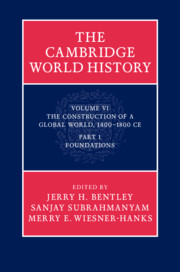Book contents
- The Cambridge World HistoryVOLUME VI
- The Cambridge World History
- The Cambridge World History
- Copyright page
- Dedication
- Contents
- Figures
- Maps
- Tables
- Contributors
- Preface
- 1 Introduction
- Part One Global matrices
- 2 “Exhausting the Earth”: environment and history in the early modern world
- 3 Globalization of disease, 1300 to 1900
- 4 Technological transitions
- 5 Patterns of urbanization, 1400 to 1800
- 6 Gender and sexuality
- Part Two Macro-regions
- Part Three Large-scale political formations
- Part Four Crossroads regions
- Part Five Overview
- Index
- References
2 - “Exhausting the Earth”: environment and history in the early modern world
from Part One - Global matrices
Published online by Cambridge University Press: 05 May 2015
- The Cambridge World HistoryVOLUME VI
- The Cambridge World History
- The Cambridge World History
- Copyright page
- Dedication
- Contents
- Figures
- Maps
- Tables
- Contributors
- Preface
- 1 Introduction
- Part One Global matrices
- 2 “Exhausting the Earth”: environment and history in the early modern world
- 3 Globalization of disease, 1300 to 1900
- 4 Technological transitions
- 5 Patterns of urbanization, 1400 to 1800
- 6 Gender and sexuality
- Part Two Macro-regions
- Part Three Large-scale political formations
- Part Four Crossroads regions
- Part Five Overview
- Index
- References
Summary
- Type
- Chapter
- Information
- The Cambridge World History , pp. 29 - 53Publisher: Cambridge University PressPrint publication year: 2015
References
Further reading
- 2
- Cited by



